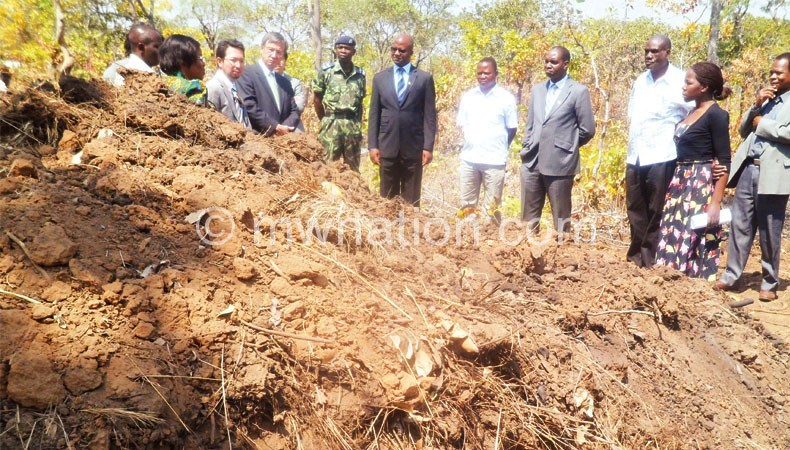Dzalanyama, plastic paper ban dominated environment news

Managing the environment is no longer a debatable priority in development planning. Governments across the globe have awaken to the danger that failure to manage the environment is akin to taking one step forward and taking six backward.
Malawi is no exception.
Over the years, we have seen government considering environmental management as a key priority area. In these years, various legislations on environment have been put in place by government.
Not only that.
The country has also seen an increase of international donor inflow in the environmental sector. The combined effect of government and non-governmental organisations in interventions in environmental sector has seen an increased public awareness of environmental issues even to those in remote areas.
However, despite the increased public awareness and concern, Malawi is experiencing some of the worst human-induced environmental degradation.
From careless disposal and management of solid and liquid waste; through wanton cutting down of trees; to uncontrolled use of farm inputs, Malawi, experts warn, is sitting on a time bomb regarding the effects of environmental degradation.
In fact, some of the effects have already began to be felt. Over the years, rainfall patterns have changed, in the process, affecting agricultural productivity. Blantyre City has been in the news, lately, with unrelenting water shortages—a problem which has been complicated by the drying up of Mudi Dam due to deforestation on its catchment area.
The year 2014, on the other hand, also saw a number of environmental issues cropping up.
However, despite many environmental issues capturing public attention, the increased deforestation at Dzalanyama Forest Reserve and the ban on plastic papers stood out in 2014.
Dzalanyama’s unresolved danger
The human-induced destruction of Dzalanyama Forest—which is in the Central Region districts of Lilongwe, Dedza and Mchinji—is a story that did not start in 2014. It is a destruction that has been in government records for years. In fact, various ministers responsible for the environment have been visiting the forest to appreciate the scale of its destruction.
However, 2014, arguably, proved a turning point for Dzalanyama. The involvement of the Japanese forestry policy adviser, Kosaku Onaka, in the management of Dzalanyama Forest Reserve changed the public understanding regarding the reserve’s destruction.
At first, Malawians could just hear that Dzalanyama reserve is experiencing wanton cutting down of trees by charcoal producers. Onaka and his team, however, carried out a comprehensive study which showed that, at the rate of its destruction, the reserve would be exhausted in the next 10 years.
That detail sent shockwaves to various corners of the country, in the process, stirring public sympathy for the reserve. A number of stakeholders started expressing interest in saving the reserve. In fact, the Minister of Natural Resources, Energy and Mining Atupele Muluzi toured the reserve twice in a week.
The question of how to, immediately, save the reserve from its imminent exhaustion drew mixed feelings from various stakeholders.
Government maintained being systematic: carrying out periodic patrols and developing an action plan that would provide alternative income-generating activities to charcoal makers.
Other stakeholders—mostly members of Parliament (MPs) and activists—wanted government to turn the reserve into a military base. Government, however, argued that although this was important, the cost of implementing is huge, especially with challenging economic times the country is experiencing.
However, as the year drew to a close, with Dzalanyama still being encroached, Muluzi assured the public that 2015 will be exciting not just for Dzalanyama, but all reserves in the country.
“We are working with various organisations and be assured that the problem at Dzalanyama will be reversed. We are taking this seriously,” he said.
Plastic ban puzzle
In 2013, the Malawi Government made a bold, environmentally-friendly move of banning production, importation and use of plastics which are less than 60 microns thick. The move was part of a global movement to control soil fertility as plastics less that 60 microns do not decompose easily.
However, government gave plastic manufactures up to June 30 2014 as a grace period to clear up old stock and also prepare for the production of the accepted plastics.
But months before the statement, on March 27 2014, companies that deal in plastics under the banner of Plastics Manufacturers Association of Malawi (Pmam) wrote then Environment Minister Halima Daud to express their concern over the plastic ban.
Notwithstanding the arguments government raised in the 2013 ban, in the letter, the companies explained why they are making plastics and also the impact the ban will have should it be effected. They even asked for an extension of the ban.
Daud, moved by the manufacturers, agreed to the extension, according to her letter dated April 14 2014, and settled for June 30 2015.
Surprisingly, the ministry’s principal secretary Dr Yanira Ntupanyama told Malawians, through an advertisement in The Daily Times of August 1 2014, that ‘it is illegal to produce, import, distribute and use thin plastics [less than 60 microns] in Malawi unless exempted’.
She even advised the public that from August 30 2014, enforcement action will be carried out in all concerned areas.
After the announcement, spot checks in some major supermarkets such as Shoprite and Sanna showed that the ban was generally obeyed.
Shockingly, manufacturers sued government for the contradiction of messages. Court documents show that the manufacturers were surprised at the ban in the wake of a letter from the then minister.
On the way forward, Muluzi said government has not reversed the ban.
“The problem we have, today, is that matters are in court. We are appealing to CSOs to join government in this exercise as friends of the court,” he said.





